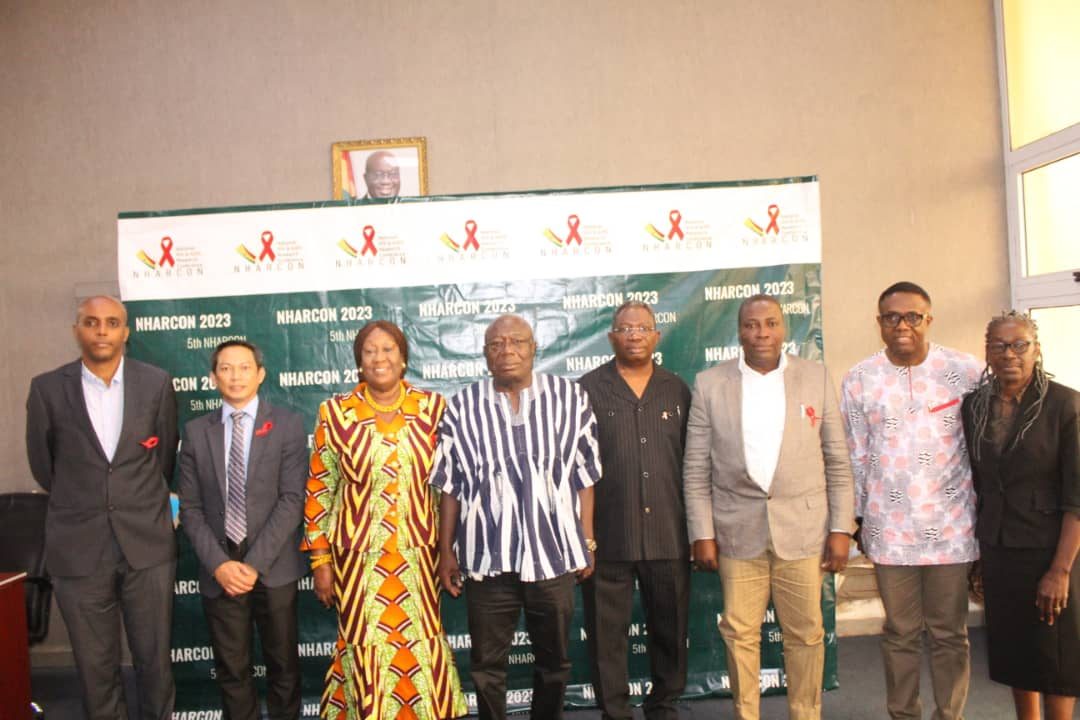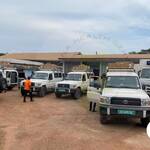Some 932 persons living with HIV/AIDS have died in the first six month of this year. They were part of the 259,408 on treatment in the country in the first half of the year.
What is even more worryingly is over 101,500 living with the virus have yet to be identified.
Programmes Manager at the National AIDS Control Programme, Dr. Stephen Ayisi Addo, announced this at the launch of the National HIV/AIDS Research Conference (NHARCON) 2023 at a ceremony in Accra.
He indicated that Bono continues to lead in prevalence at above 4% for both routine and Health Support Services (HSS) data. It is followed by the Ahafo Region.
The conference, which is the fifth edition, is slated for April 25 to 28, 2023, will serve as a platform to share ideas in support of the implementation of the current National Strategic Plan (NSP) 2021-2025.
The Fifth NHARCON is under the theme ‘Achieving HIV Epidemic Control Amidst Emerging Health Threats’.
The conference forms part of Ghana AIDS Commission’s (GAC) mandate to disseminate and share HIV and AIDS strategic information with its stakeholders and partners in the implementation of the National Response.
Director General of GAC, Dr Kyeremeh Atuahene, indicated that Ghana recorded a reduction in new infections and cases of AIDS-related deaths by 26% and 38% respectively, between 2017 and 2021.
This, according to him was as a result of the resources, expertise and commitment invested towards the fight against the disease over the years.
The Director General further asserted that despite the reduction recorded, GAC faces mounting challenges as over 100,000 individuals in the country live with HIV without knowing their status.
This, he said, has the potential of preventing the GAC’s aim of achieving its goal of 95% status knowledge, 95% in the administration of anti-retrovirus drugs and 95% in viral suppression.
Dr Atuahene noted that misconceptions about the virus account for the low knowledge of status among individuals in the country and therefore encouraged individuals to go for testing as it is free.
He said the NHARCON 2023, would consider the impact of the HIV and other public health hazards and how to lessen the effects of the diseases.
He said the resources, expertise and commitment invested in the national HIV response had resulted in low prevalence and increased treatment uptake, which had kept persons with HIV alive, strong, and healthy.
He appealed for the provision of high-impact services to address infectious diseases such as HIV, TB, COVID-19, Viral Hepatitis, STIs and non-communicable diseases such as diabetes and cardiovascular diseases.
The Minister for Environment, Science, Technology and Innovation, Dr. Kwaku Afriyie who launched the conference lauded the GAC and other health professionals for their fight against the disease.
He said that the Fifth (NHARCON) 2023 will focus on an integration agenda for HIV, Tuberculosis (TB), COVID-19, and Sexually Transmitted Infections (STI) services to ensure a comprehensive and inclusive health response for the country.
He stated that the outbreak of COVID-19 had overshadowed the raging effects of HIV/AIDS and other diseases.
The Minister added that COVID-19 has taught the government an important lesson to intensify its integration efforts and mitigate the effects of setbacks as they renew their determination.
“Ghana can rebuild its economy and its health programmes by drawing on lessons learned from the HIV response over the last four decades to address emerging infectious and non-communicable diseases” he advised.
Dr. Afriyie said that he looks forward to NHARCON focusing on addressing the social and structural drivers of HIV/AIDS and shining a spotlight on gender inequality and social protection for key populations and vulnerable people.
He noted that the Fifth NHARCON will have a deep and long-lasting impact on the country’s HIV/AIDS, Tuberculosis, COVID-19, and STI responses.
He called on all stakeholders to rally behind and participate in the NHARCON and to adopt the integration agenda to propel the African continent towards ending AIDS by the year 2030.
Professor William Ampofo, the Conference Chair, said to achieve the goal of making Ghana an AIDS-free country, there was the need for evidence to inform programming to impact the National HIV and AIDS response positively.
He said providing opportunities for researchers to share latest scientific advances, learn from each other’s expertise, and reviewing strategies for advancing the fast track 95-95-95 strategy would contribute to addressing HIV and its related diseases to ultimately end AIDS by 2030.
The aim of the 95-95-95 strategy is to diagnose 95 per cent of all HIV-positive individuals, provide antiretroviral therapy (ART) for 95 per cent of those diagnosed and achieve viral suppression for 95 per cent of those treated by 2025.
“Discussing and identifying future programme strategies and research priorities in light of the evidence and best practices also addresses HIV and its related diseases,” he said.
Mr Ampofo explained that the conference had been divided into scientific and non-scientific sessions.
The scientific session includes satellite symposia and abstract-driven meetings while the non-scientific ones involve the commercial and non-commercial exhibitions, and workshops for developing new skills.
He urged the Ghana AIDS Commission not to lose guard in achieving its goals, saying, “even under the threat of public health emergencies, we must not relent in our goal for an AIDS-free Ghana.”
- Kasoa Ritual Murder: Kini gets life imprisonment; minor referred to juvenile court for sentencing - 25 October 2024
- Friday October 25 2024 Newspaper Headlines - 25 October 2024
- Over 100 Ghanaians abroad issued Ghana Cards - 25 October 2024




